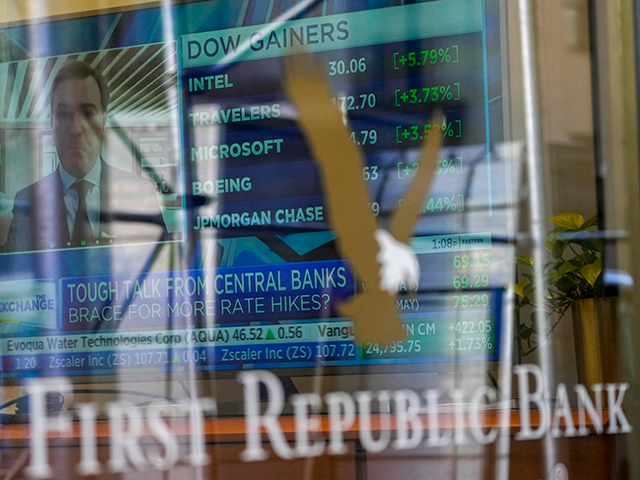First Republic Bank’s stock price crumbled on Friday despite big banks’ injection of $30 billion in uninsured deposits into the institution, suggesting the “rescue” did not inspire confidence as intended.
Not only did First Republic’s stock price crash — it was down around 25 percent at noon eastern time Friday — but several of the big banks that rescued the bank have experienced a drop in stock price. Shares of Wells Fargo were down by 4.2 percent, shares of Citigroup fell 3.6 percent, shares of Bank of America dropped four percent, and shares of J.P. Morgan Chase declined by 3.3 percent.
On Thursday, the Federal Reserve, Federal Deposit Insurance Corp., and the Office of the Comptroller of the Currency said the rescue was a reflection of the big banks’ “confidence in the country’s banking system.”
“Together, we are deploying our financial strength and liquidity into the larger system, where it is needed the most,” the agencies said.
The banks that came to the “rescue” were Bank of America, Wells Fargo, Citigroup, and J.P. Morgan Chase, which contributed about $5 billion apiece. Goldman Sachs and Morgan Stanley deposited about $2.5 billion, according to the banks’ press release. Truist, PNC, U.S. Bancorp, State Street, and Bank of New York Mellon deposited about $1 billion each.
The massive deposits are obligated to remain in First Republic for at least 120 days, according to CNBC.
First Republic had suffered a downturn in the stock price in recent days, fueled by the collapse of Silicon Valley Bank and Signature Bank over the weekend. An underlying factor causing the initial Silicon Valley Bank run was the FED’s interest rate hikes due to the Biden administration’s soaring inflation.
Due to the interest rate hikes to tamp inflation, borrowing money became more expensive for businesses, causing business depositors to access their savings at the institution.
Follow Wendell Husebø on Twitter @WendellHusebø. He is the author of Politics of Slave Morality.

COMMENTS
Please let us know if you're having issues with commenting.